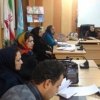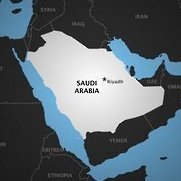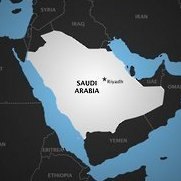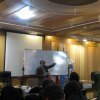
Saudi Arabia: Cleric who Backed Protests on Trial for His Life
Saudi Arabia: Cleric who Backed Protests on...
 Authorities shot al-Nimr, 52, in the leg four times in disputed circumstances as they arrested him on July 8, 2012. He went on trial before Riyadh’s Specialized Criminal Court on March 26, 2013, accused of “sowing discord” and “undermining national unity.” Prosecutors called for al-Nimr’s execution by “crucifixion,” a punishment of beheading followed by display of the decapitated body in public.
Authorities shot al-Nimr, 52, in the leg four times in disputed circumstances as they arrested him on July 8, 2012. He went on trial before Riyadh’s Specialized Criminal Court on March 26, 2013, accused of “sowing discord” and “undermining national unity.” Prosecutors called for al-Nimr’s execution by “crucifixion,” a punishment of beheading followed by display of the decapitated body in public.
“As a court debates whether to kill Nimr al-Nimr and string his corpse to a pole, he is suffering from the gunshot wounds he sustained when security forces arrested him,” said Sarah Leah Whitson, Middle East director at Human Rights Watch. “It is outrageous that a man of his standing has been targeted in this way and that authorities have ignored his family’s repeated pleas for adequate medical care.”
A family member told Human Rights Watch that al-Nimr is not receiving adequate medical treatment for his wounds. Doctors extracted three bullets but a fourth remains in his leg where, the family member said, the bullets shattered a bone. The doctors in the Security Forces Prison Hospital, under the Interior Ministry’s authority, deny that his treatment is inadequate and have refused the family’s requests for a second opinion.
Medical staff at the prison hospital have not provided access to regular medical care or physical therapy, the family member said. Al-Nimr is in constant pain, cannot put weight on his left leg and has to use crutches to walk.
Authorities held al-Nimr for eight months before bringing charges, although the Interior Ministry labeled him an “instigator of discord and rioting” after his arrest. Officials claim he resisted arrest and rammed a security forces’ vehicle, leading to a gun battle in which he was wounded. Purported photos of the incident released by the local media show the wounded sheikh slumped in the back seat of a car wearing a bloodied white robe. A family member said, however, that al-Nimr did not own a gun and they dispute the claims that he resisted arrest.
Local activists and family members say that al-Nimr supported only peaceful protests and has eschewed all violent opposition to the government. A 2011 BBC report quoted him as supporting “the roar of the word against authorities rather than weapons … the weapon of the word is stronger than bullets, because authorities will profit from a battle of weapons.” In another video available on YouTube, al-Nimr states, “It is not permitted to use weapons and spread corruption in society.”
Saudi Arabia’s Rasid news website has reported that al-Nimr faces charges of “inciting to infringe on property of the state,” “interference in the affairs of a sister nation,” and “incitement to commit terrorism crimes [in the sister nation],” – assumed to be Bahrain, given the sheikh’s public criticism of the Sunni government’s fierce crackdown on Shia protesters there.
In addition, local activists told Human Rights Watch that the trial court has cited other possible charges, including “instigating riots,” “heightening sectarian strife,” “destabilizing the security of the state and calling on sons of the country to participate,” and “storing materials on the internet that harm public order and religious values.”
At the first hearing on March 26, prosecutors urged the court to sentence al-Nimr to execution by “crucifixion,” the penalty reserved for the most serious crimes.
At the next hearing, on April 30, one of those present told Human Rights Watch that the judge agreed that al-Nimr’s lawyer and brother could attend the trial and serve as his defense team. As far as Human Rights Watch has been able to determine, the court has refused to assess whether detaining him is still justified after 10 months without review.
Local activists told Human Rights Watch that the authorities have held al-Nimr in an isolation cell in the Security Forces Prison Hospital in Riyadh. Family members who have visited say that he is held in a windowless cell measuring 4-by- 4 meters. Authorities did not allow al-Nimr to speak freely with visiting family members for the first four months, but since November have allowed immediate family members to see him in his cell for an hour every two weeks.
The family member said that al-Nimr, who holds the religious rank of Ayatollah, maintains a wide following within Saudi Arabia’s Eastern Province, where most of the country’s Shia minority live, and among Shia in other states due to his religious rulings and religious instruction of Shia students.
His arrest caused protest demonstrations in Awamiyya, a Shia village in the Qatif district, which has been the site of anti-government demonstrations for two years. Media reported that security forces shot and killed two demonstrators on the evening of al-Nimr’s arrest.
The local activists said that al-Nimr has developed a strong following among Shia youth in Eastern Province due to his outspoken criticism of government policies and advocacy of greater rights for the Shia, who accuse Saudi Arabia’s Sunni authorities of discrimination. In late March 2009, al-Nimr suggested in a Friday sermon that the Shia might consider seceding from Saudi Arabia if the government continued its failure to respect their rights. In response, security forces tried to detain him. He went into hiding, and his supporters held protests.
In June 2012, less than a month before his arrest, al-Nimr gave a Friday sermon following the death of Prince Nayef, the former interior minister. “Where is Nayef’s army?” al-Nimr said. “Can they stop his death? Where is his secret police? Where are his officers? Can they stop his death so that worms won’t eat him?”
Saudi Arabia systematically discriminates against its Shia citizens, who constitute 10 to 15 percent of the population. This discrimination diminishes Shias’ access to public education and government employment. They do not receive equal treatment under the justice system, especially with regard to religious freedom. Shia rarely receive permission to build mosques, and, unlike their Sunni counterparts, do not receive government funds for religious activities.
Human Rights Watch has urged the Saudi authorities to abolish the Specialized Criminal Court, where al-Nimr is being tried. The government set up the court in 2008 to try terrorism cases but has increasingly used it to prosecute peaceful dissidents on politically motivated charges and in proceedings that violate the fundamental right to a fair trial.Saudi authorities do not always inform suspects of the charges they face or the supporting evidence. Saudi Arabia has no penal code, so prosecutors and judges largely define criminal offenses at their discretion. Lawyers are not generally allowed to assist suspects during interrogation and face difficulty examining witnesses or presenting evidence at trial. In all criminal cases, the judge can change the charges against the defendant at any time.
Article 13 of the Arab Charter on Human Rights, to which the Saudi Arabia is a state party, states that “[e]veryone has a right to a fair trial that affords adequate guarantees before a competent, independent and impartial court…” Article 16 mandates that in the course of an investigation and trial every defendant should have minimum guarantees, including the right to be informed promptly of the charges, adequate time and facilities to prepare a legal defense, and the right to communicate confidentially and freely with lawyers.
International standards, including article 14 of the Arab Charter on Human Rights, state that “pre-trial detention should not be general rule” for suspects under investigation or on trial, and that those in pre-trial detention are entitled to a trial within a reasonable time or release. Saudi officials are obliged to conduct periodic reviews of al-Nimr’s detention to assess whether there is adequate justification for holding him in pre-trial detention or whether he can be released on bail.
“The Saudi criminal justice system is notorious for arbitrary detentions and unfair trials, often followed by outrageous and gruesome punishments,” Whitson said. “If Saudi Arabia is serious about criminal justice reform, as it has claimed, it should create a penal code, uphold fair trial rights, and cease using inhuman punishments.”
Human Rights Watch
 Reload
Reload


